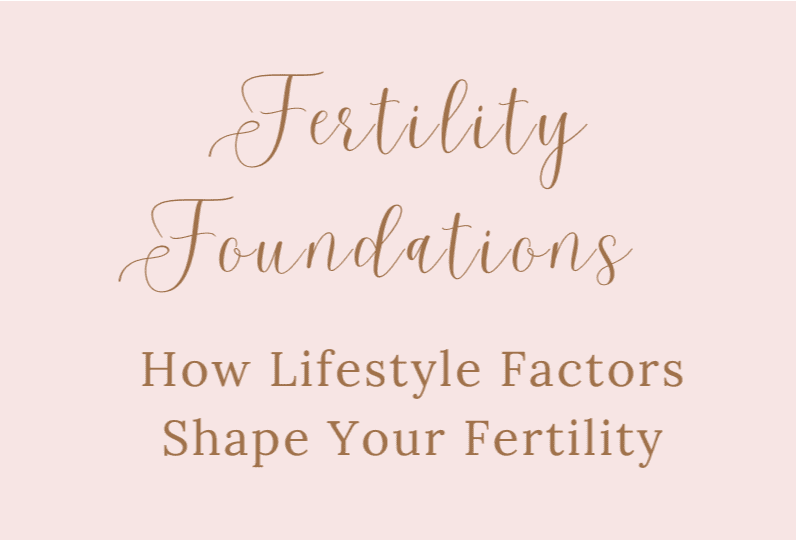

Fertility is a reflection of an individual’s overall health, and many overlook the impact of lifestyle factors on reproductive wellness. While medical conditions certainly play a role, factors like daily habits, diet, environment, and emotional health can significantly affect fertility. This guide explores the key lifestyle factors influencing fertility and provides practical advice for optimizing reproductive health naturally.
Many individuals lack a full understanding of their reproductive health and menstrual cycle, which can make it difficult to recognise fertility windows, hormonal imbalances, or potential underlying health issues. Being attuned to your body's natural rhythms and fertility signs is crucial for improving the chances of conception. Understanding your menstrual cycle is the first step to gaining control over your fertility.
The menstrual cycle plays a central role in fertility. A typical cycle lasts about 28 days, though it can vary from person to person. During this time, the body goes through several phases, including menstruation, the follicular phase, ovulation, and the luteal phase. Each phase impacts fertility differently, and knowing how to track these stages can significantly enhance your chances of conception. For example, ovulation is the time when an egg is released from the ovary, and this is the most fertile period of the month.
Nutrition plays a pivotal role in reproductive health. Adequate intake of essential nutrients supports egg quality, hormone regulation, and overall fertility. Deficiencies in key vitamins and minerals can hinder conception and affect hormonal function. A nutrient-dense diet not only supports overall health but is also essential for reproductive success.
Specific nutrients such as folate, zinc, and omega-3 fatty acids are crucial for healthy egg and sperm production. Folate, for example, helps prevent neural tube defects in the developing baby and supports healthy cell division, which is essential for fertilisation and early embryo development. Zinc is vital for cellular growth and immune function, and omega-3s help with hormone production and reduce inflammation. These nutrients are particularly important when preparing the body for conception, as they help optimise reproductive health.
Exercise plays a crucial role in hormonal balance, circulation, and fertility. However, it's essential to find the right balance, as both excessive and sedentary lifestyles can disrupt reproductive health. Regular moderate exercise has numerous benefits, including reducing stress, improving blood circulation to the reproductive organs, and helping to maintain a healthy weight, which can enhance fertility.
Excessive exercise, especially high-intensity workouts, can cause the body to produce too much cortisol, the stress hormone, which may negatively impact fertility. On the other hand, being sedentary can lead to hormonal imbalances and issues such as weight gain or insulin resistance, both of which can affect fertility. It's all about finding that sweet spot where your body is active but not overstressed.
Chronic stress can significantly disrupt fertility by interfering with hormone balance and reproductive function. High stress levels can impact key hormones, potentially delaying conception. Stress activates the body’s “fight or flight” response, which prioritises immediate survival over reproduction. This can have a detrimental effect on fertility by disrupting hormonal regulation, including the production of progesterone, which is crucial for pregnancy.
The emotional and psychological toll of stress also affects other aspects of fertility, such as libido and relationship dynamics, which can be important factors when trying to conceive. Additionally, high cortisol levels can disrupt the normal balance of other hormones involved in the reproductive process.
Several studies confirm that stress can indeed have a negative impact on fertility, highlighting its role in both hormone regulation and conception rates. For instance, research has shown that high levels of stress correlate with lower rates of conception, especially in women undergoing fertility treatments.
Quality sleep is essential for hormonal regulation and overall reproductive health. Insufficient or disrupted sleep can impair ovulation and lead to fertility problems. Sleep is a critical period for the body to rest and restore, including the replenishment of hormones that are essential for reproductive function.
Sleep deprivation disrupts the production of melatonin, which regulates the sleep-wake cycle, and cortisol, a stress hormone. Poor sleep can also increase insulin resistance, which affects hormonal function and contributes to conditions such as polycystic ovary syndrome (PCOS). For optimal fertility, it’s important to prioritise restorative sleep.
Studies have demonstrated that adequate sleep is a crucial aspect of fertility health, showing that disruptions in sleep can contribute to irregular menstrual cycles and hormonal imbalances.
Environmental toxins can disrupt hormone function and negatively affect fertility. These toxins are often found in everyday items like plastics, pesticides, and personal care products. Endocrine-disrupting chemicals (EDCs) can mimic or interfere with hormones, leading to reproductive challenges for both men and women.
Toxins like bisphenol A (BPA), phthalates, and heavy metals have been linked to reduced fertility and reproductive health problems. Reducing exposure to these substances can help support hormonal health and improve fertility. Simple swaps in daily life, such as using glass containers or avoiding synthetic fragrances, can significantly reduce your exposure to harmful chemicals.
Energetic balance, the harmony between masculine and feminine energies, plays a vital role in fertility and overall reproductive health. This concept is rooted in both ancient healing traditions and supported by modern mind-body science, which together highlight the profound connection between emotional wellbeing, hormonal regulation, and reproductive function.
When women spend prolonged periods in “masculine energy” (doing, striving, controlling), stress hormones like cortisol and adrenaline can become chronically elevated. This often leads to nervous system dysregulation, hormonal imbalances, and disrupted ovulation, ultimately impairing fertility. In contrast, cultivating “feminine energy” (receiving, feeling, surrendering) supports the parasympathetic nervous system, enhancing hormonal rhythm, nervous system balance, and reproductive vitality.
Beyond energetic imbalances, unresolved emotional trauma or suppressed feelings can also contribute to fertility challenges. Emotions often become stored in the body, manifesting as physical tension, particularly in the pelvic region, which is energetically linked to creativity, receptivity, and emotional expression. When this area becomes stagnant due to unprocessed stress, grief, or emotional pain, the natural flow of energy can be disrupted, affecting hormonal function and fertility. Chronic stress and emotional dysregulation may also impair the hypothalamic-pituitary-adrenal (HPA) axis, a key hormonal feedback loop that influences ovulation and plays a significant role in conditions like PCOS, endometriosis, and unexplained infertility.
Lifestyle factors play a significant role in fertility, affecting everything from hormone regulation to reproductive function. By making informed choices about diet, exercise, stress management, sleep, and environmental exposure, individuals can significantly enhance their chances of conception. Consider incorporating these lifestyle changes into your routine to optimise reproductive health and support your fertility journey.
4.7 rating on App Stores